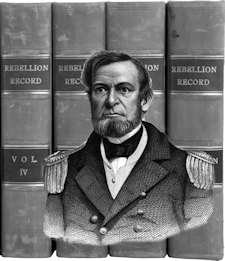January 7.—A detachment of General Kelly’s forces, commanded by Colonel Dunning, Fifth Ohio, left Romney last night at twelve o’clock, and attacked the rebels, two thousand strong, at Blue’s Gap, Va., east of Romney, at daylight this morning. The rebels were completely routed, with a loss of fifteen killed, two pieces of cannon, their wagons, tents, etc, with twenty prisoners, including one commissioned officer.—(Doc. 8.)
—Ex-governor Morehead, of Kentucky, was released from Fort Warren on his parole, and proceeded immediately to New-York.
—At Washington, D. C, in the Senate, petitions for the emancipation of slaves and for the exchange of prisoners, were presented. A bill relative to the arrest of fugitive slaves by officers of the army or navy, was taken up, but its consideration was again postponed for the present, after a refusal of the Senate to postpone it indefinitely. The Kansas contested seat case was then taken up, but the Senate adjourned without proceeding with it. In the House, a message was received from the President, accompanying the documents relating to the Trent affair. Mr. Vallandigham, of Ohio, took occasion to express his dissatisfaction at the course pursued by the Government in delivering up Mason and Slidell; remarking that in less than three months we would be at war with Great Britain, or else we would tamely submit to the recognition of the Southern Confederacy, and the breaking up of the blockade. Mt. Hutching, his colleague, replied, saying that Vallandigham had heretofore been opposed to coercion as to the South, while now he is against the delivery up of Mason and Slidell, and consequently in favor of war. The position of his colleague was liable to suspicion that his belligerent attitude was one which would benefit the rebels, by causing a war between England and the United States—a war which the South desired. Mr. Thomas, of Massachusetts, argued in justification of the capture of Mason and Slidell. England did us grievous wrong in making the demand for them, which was unjust and insolent in spirit She has done that which implanted in the American breast a sense of wrong, and we shall await the opportunity to strike the blow of retributive justice. The message and documents were finally referred to the Committee on Foreign Affairs.
—Flag – Officer Foote, with the gunboats Essex, Lexington, and Tyler, made a reconnoissance down the Mississippi River to a point within two miles of Columbus, Ky. He went within two hundred yards of the range of the rebel batteries, and on returning was fired upon by the rebel gunboat Mohawk, but her shots all fell short.
—In the State Senate of Virginia, (rebel,) a resolution offered by Mr. Newman was adopted, appropriating so much of the public debt of the State and other securities held by resident citizens of the United States and the District of Columbia, as might be necessary to indemnify the citizens of Virginia who were loyal to the State, for losses sustained by them in consequence of any confiscation act of the Congress of the United States, or any other act growing out of the war.— Richmond Examiner.
—A skirmish took place between a part of the Second Virginia (Union) cavalry, under Colonel Bowles, and a portion of Marshall’s forces, under Shaw, three miles west of Paintsville, on Jennie Creek, Ky. The rebels lost six killed, fourteen wounded, and seven prisoners. The Unionists lost two killed and one wounded.
Before Colonel Bowles attacked him, Humphrey Marshall addressed his men, advising the surrender of the whole force. The men refused, saying that they preferred fighting to such a cowardly course. After a skirmish Marshall’s whole force fled, and three hundred picked infantry and nine Union cavalry pursued.—(Doc. 9.)
—Colonel J. A. Garfield, with his brigade, consisting of the Forty-second regiment of Ohio Volunteers, the Fourth Kentucky, and three hundred of the Second Virginia cavalry, occupied the town of Paintsville, Ky. He says, in his despatch: “On hearing of my approach the main rebel force left their strongly intrenched camp and fled. I sent my cavalry to the mouth of Jennie Creek, where they attacked and drove the rebel cavalry, which had been left as a vanguard, a distance of five miles, killing three and wounding a considerable number. Marshall’s whole army is now flying in confusion. He had abandoned and burned a large amount of his stores. We have taken ten prisoners. Our loss was two killed and wounded.”



